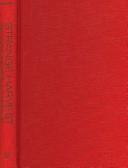| Listing 1 - 1 of 1 |
Sort by
|

ISBN: 128235843X 9786612358432 0520939611 1601295308 9780520939615 1429419156 9781429419154 9781601295309 0520247841 0520247868 9780520247840 9780520247864 Year: 2006 Publisher: Berkeley University of California Press
Abstract | Keywords | Export | Availability | Bookmark
 Loading...
Loading...Choose an application
- Reference Manager
- EndNote
- RefWorks (Direct export to RefWorks)
Strange Harvest illuminates the wondrous yet disquieting medical realm of organ transplantation by drawing on the voices of those most deeply involved: transplant recipients, clinical specialists, and the surviving kin of deceased organ donors. In this rich and deeply engaging ethnographic study, anthropologist Lesley Sharp explores how these parties think about death, loss, and mourning, especially in light of medical taboos surrounding donor anonymity. As Sharp argues, new forms of embodied intimacy arise in response, and the riveting insights gleaned from her interviews, observations, and descriptions of donor memorials and other transplant events expose how patients and donor families make sense of the transfer of body parts from the dead to the living. For instance, all must grapple with complex yet contradictory clinical assertions of death as easily detectable and absolute; nevertheless, transplants are regularly celebrated as forms of rebirth, and donors as living on in others' bodies. New forms of sociality arise, too: recipients and donors' relatives may defy sanctions against communication, and through personal encounters strangers are transformed into kin. Sharp also considers current experimental research efforts to develop alternative sources for human parts, with prototypes ranging from genetically altered animals to sophisticated mechanical devices. These future trajectories generate intriguing responses among both scientists and transplant recipients as they consider how such alternatives might reshape established-yet unusual-forms of embodied intimacy.
Death --- Ethnology --- Funeral rites and ceremonies --- Kinship --- Medical anthropology --- Memorials --- Mourning customs --- Transplantation of organs, tissues, etc. --- Medical transplantation --- Organ transplantation --- Organ transplants --- Organs (Anatomy) --- Surgical transplantation --- Tissue transplantation --- Tissues --- Transplant surgery --- Transplantation surgery --- Transplants, Organ --- Surgery --- Preservation of organs, tissues, etc. --- Procurement of organs, tissues, etc. --- Manners and customs --- Rites and ceremonies --- Medical care --- Medicine --- Anthropology --- Dying --- End of life --- Life --- Terminal care --- Terminally ill --- Thanatology --- Social aspects --- Transplantation --- Anthropological aspects --- Philosophy --- anthropologists. --- anthropology. --- death and mourning. --- denatured bodies. --- donor families. --- ethnographers. --- ethnographic study. --- genetically altered bodies. --- interviews. --- mechanical body replacements. --- medical science. --- medical taboos. --- medical technology. --- modern medicine. --- nonfiction. --- organ donors. --- organ harvesting. --- organ transplantation. --- organ transplants. --- rebirth. --- social analysis. --- social intimacy. --- social science. --- transformation. --- transplant recipients.
| Listing 1 - 1 of 1 |
Sort by
|

 Search
Search Feedback
Feedback About UniCat
About UniCat  Help
Help News
News